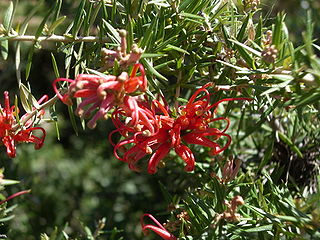
Forsythia, is a genus of flowering plants in the olive family Oleaceae. There are about 11 species, mostly native to eastern Asia, but one native to southeastern Europe. Forsythia – also one of the plant's common names – is named after William Forsyth.

Pinus contorta, with the common names lodgepole pine and shore pine, and also known as twisted pine, and contorta pine, is a common tree in western North America. It is common near the ocean shore and in dry montane forests to the subalpine, but is rare in lowland rain forests. Like all pines, it is an evergreen conifer.

Acacia aneura, commonly known as mulga or true mulga, is a shrub or small tree native to arid outback areas of Australia. It is the dominant tree in the habitat to which it gives its name (mulga) that occurs across much of inland Australia. Specific regions have been designated the Western Australian mulga shrublands in Western Australia and Mulga Lands in Queensland.

The Burmese python is one of the largest species of snakes. It is native to a large area of Southeast Asia and is listed as Vulnerable on the IUCN Red List. Until 2009, it was considered a subspecies of the Indian python, but is now recognized as a distinct species. It is an invasive species in Florida as a result of the pet trade.

Eucryphia is a small genus of trees and large shrubs native to the south temperate regions of South America and coastal eastern Australia, mainly Tasmania. Sometimes placed in a family of their own, the Eucryphiaceae, more recent classifications place them in the Cunoniaceae. There are seven species, two in South America and five in Australia, and several named hybrids.

The Indian python is a large python species native to tropical and subtropical regions of the Indian subcontinent and Southeast Asia. It is also known by the common names black-tailed python, Indian rock python, and Asian rock python. Although smaller than its close relative the Burmese python, but is still among the largest snakes in the world. It is generally lighter colored than the Burmese python and reaches usually 3 m. Like all pythons, it is nonvenomous.

Juniperus sabina, the savin juniper or savin, is a species of juniper native to the mountains of central and southern Europe and western and central Asia, from Spain to eastern Siberia, typically growing at altitudes of 1,000–3,300 metres.

Banksia nutans, commonly known as nodding banksia, is a species of shrub native to the south coast of Western Australia in the genus Banksia. Growing to a metre (3 ft) tall, it has pale blue-green fine-leaved foliage and unusual purple-brown inflorescences which hang upside down rather than grow upright like most other banksias.

Banksia paludosa, commonly known as the marsh or swamp banksia, is a species of shrub in the plant genus Banksia. It is native to New South Wales, Australia, where it is found between Sydney and Batemans Bay, with an isolated population further south around Eden. There are two recognised subspecies, the nominate of which is a spreading shrub to 1.5 m (4.9 ft) in height, and subsp. astrolux is a taller shrub to 5 m (16 ft) high found only in Nattai National Park.

Grevillea juniperina, commonly known as juniper- or juniper-leaf grevillea or prickly spider-flower, is a plant of the family Proteaceae native to eastern New South Wales and southeastern Queensland in Australia. Scottish botanist Robert Brown described the species in 1810, and seven subspecies are recognised. One subspecies, G. j. juniperina, is restricted to Western Sydney and environs and is threatened by loss of habitat and housing development.

Ericameria nauseosa, commonly known as Chamisa, rubber rabbitbrush, and gray rabbitbrush, is a shrub in the sunflower family (Aster) found in the arid regions of western North America.

The perennial vine Lonicera hispidula is a species of honeysuckle known as pink honeysuckle and, less often, California honeysuckle. It is a low-elevation woodlands shrub or vine found on the West Coast of North America.

Calystegia macrostegia, with the common names island false bindweed and island morning glory, is a species of morning glory in the family Convolvulaceae.

Bursaria spinosa is a small tree or shrub in the family Pittosporaceae. The species occurs mainly in the eastern and southern half of Australia and not in Western Australia and the Northern Territory. Reaching 10 m (35 ft) high, it bears fragrant white flowers at any time of year but particularly in summer. A common understorey shrub of eucalyptus woodland, it colonises disturbed areas and fallow farmland. It is an important food plant for several species of butterflies and moths, particularly those of the genus Paralucia, and native bees.

Forsythia suspensa, commonly known as weeping forsythia or golden-bell, is a species of flowering plant in the family Oleaceae, it is native to China.

Forsythia × intermedia, or border forsythia, is an ornamental deciduous shrub of garden origin.

Euphilotes battoides, the square-spotted blue or buckwheat blue, is a species of butterfly of the family Lycaenidae. It is found in western North America from Washington south to Baja California Norte and then west to southern Colorado and New Mexico.
Citrus inodora or Microcitrus inodora, commonly known as Russell River lime or large leaf Australian wild lime, is a tree native to the Bellenden-Ker Range in northern Queensland, Australia.

Malayopython is a genus of constricting snakes in the family Pythonidae. The genus is native to India and Southeast Asia. It contains two species, both of which were previously classified within the genus Python. However, multiple studies recovered these species as distinct. Known as the "reticulatus clade", it was eventually found to be a sister lineage to a lineage giving rise to the Indo-Australian pythons rather than the genus Python.

Baštejķalns Park is a spacious park on the eastern edge of the old town of Latvian capital Riga.


















